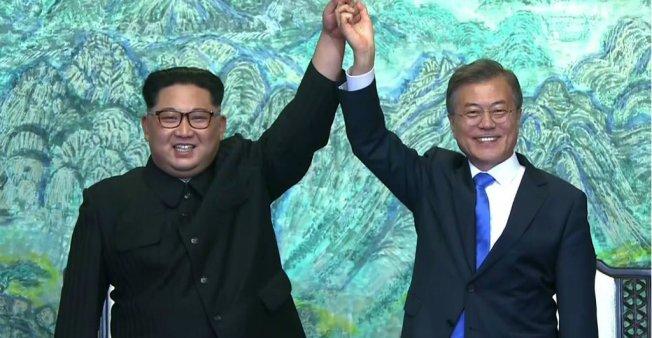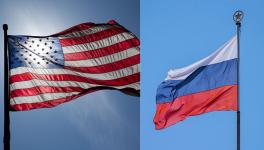No More War in the Korean Peninsula, Declare Kim, Moon

Today’s North-South Korea summit, which marked the first occasion when a ruling North Korean leader crossed the de-facto border and entered the South since the Korean war, yielded a joint statement by the Presidents of the two countries.
The statement, apart from reiterating a commitment to complete denuclearization of the Korean peninsula, also agrees to cease military hostilities and to pursue a peace treaty. The joint statement also hints that both the sides are interested in pursuing the reunification of the peninsula as a long-term objective.
On invitation by the North Korean leader Kim Jong-un this morning, South Korean President Moon Jae-in briefly walked over to the North across the DMZ, the world’s most militarized zone, before returning to the South for discussions at the border village of Panmunjom. Before entering the meeting in the Peace House at the village, Kim reportedly signed in the guest book a message announcing a “new era of peace”.
Assuring Moon of his determination “to send a starting signal at the threshold of a new history,” Kim reiterated his commitment to stop nuclear missile testing, after each of which South Korean leaders had to rush for an early morning security meetings. “We won’t interrupt your early morning sleep anymore,” Kim joked to Moon.
After a first round of closed door talks which lasted for 100 minutes, where the issue of the denuclearization of the Korean peninsula was discussed and a decision was made to draft a declaration, the first session was adjourned.
Following another round of talks at 4:30 p.m (Korean time), the two leaders signed a joint statement which agreed on a number of decisions towards reaching a peace accord.
Calling the rivalry between the two Koreas a "Cold War relic", the joint statement affirmed that, “The two leaders solemnly declared before the 80 million Korea people and the whole world that there will be no more war on the Korean Peninsula and thus a new era of peace has begun.”
Practical measures agreed upon to cease military hostilities
On the military front, the two sides have "agreed to completely cease all hostile acts against each other in every domain, including land, air and sea".
In a bid "to transform the demilitarized zone” - between which runs the de-facto border - “into a peace zone in a genuine sense", the two Koreas have agreed to cease all propaganda activities from May 1 this year. These includes broadcast of propaganda messages over massive loudspeakers and distribution of pamphlets.
The joint statement also announces that a meeting between the military Generals of the two countries will be convened next month, following which "frequent meetings" will be held "between military authorities, including the Defense Ministers.. in order to immediately discuss and solve military issues that arise between them."
In the past, clashes across the the Northern Line Limit, which is the de-facto maritime border extending from the Military Demarcation line into the West Sea, numerous military personnel from both sides have been killed and battleships have been sunk. To "prevent accidental military clashes and guarantee safe fishing activities", the countries have "agreed to devise a practical scheme to turn the areas around the Northern Limit in the West Sea into a maritime peace zone".
Hints at interest in reunification on both sides
The geo-strategic interests of foreign powers, particularly that of US, have historically shaped the developments in the peninsula since the war. The statement that “South and North Korea affirmed the principle of determining the destiny of the Korean nation on their own accord”, is of particular significance, as it hints at South Korea’s intention to assert its stand, independent of the American line.
The two countries have taken yet another step towards demonstrating their solidarity by declaring that they would jointly participate in international sports events, such as the 2018 Asian games.
The use of “Korean nation” in the statement also opens the door to new possibilities.The joint statement adds that “In order to rejuvenate the sense of national reconciliation and unity..active cooperation, exchanges, visits and contacts at all levels" will be encouraged.
As a first step towards achieving this reunification in the long-run, the statement announces reunification programmes for the families separated after the division of Korea, on the National Liberation Day of August 15 this year - when both the countries celebrate their independence from Japan.
The statement also mentions that in the city of Gaeseong in the southern part of North Korea, a liaison office will also be established with resident representatives of both sides, “in order to facilitate close consultation between the authorities”.
Further, "the two sides agreed to adopt practical steps towards the connection and modernization of the railways and roads on the eastern transportation corridor as well as between Seoul and Sinuiju".
A commitment to denuclearization
The Korean War of 1953 came to an end with an armistice signed between the North Korea, the US and China. However, in absence of a peace treaty, the two countries are technically still at war.
To put an end to this precarious state, the countries have agreed to “actively cooperate to establish a permanent and solid peace regime on the Korean Peninsula. Bringing an end to the current unnatural state of armistice and establishing a robust peace regime on the Korean Peninsula is a historical mission that must not be delayed any further,” the statement said.
However, recognizing that no peace accord can take effect without the US and China, the statement affirms a common intent to engage the two countries in meetings.
“South and North Korea agreed to actively pursue trilateral meetings involving the two Koreas and the United States, or quadrilateral meetings involving the two Koreas, The United States and China with a view to declaring an end to the War and establishing a permanent and solid peace regime,” the statement affirms.
Once the various measures agreed upon by the two sides begin to alleviate the military tensions, North and South Korea have “agreed to carry out disarmament in a phased manner”.
"South and North Korea confirmed the common goal of realizing, through complete denuclearization, a nuclear-free Korean Peninsula. South and North shared the view that measures being initiated by North Korea are very meaningful and crucial for the denuclearization of the Korean Peninsula and agreed to carry out their respective roles and responsibilities in this regard,” the statement said.
However, whether or not the denuclearization of the Korean peninsula also implies a prohibition on US ships and submarines carrying nuclear weapons from entering the Korean waters remains an unanswered question.
Following the joint statement, Kim said, in an apparent reference to the failures of the previous attempts made by the two countries to achieve peace: “We hope we will not repeat our mistake of the past.. I hope this will be an opportunity for the two Korean peoples to move freely from North to South. We need to take responsibility for our own history.”
Welcoming the breakthrough, Japanese Prime Minister Shinzo Abe said, “Today President Moon Jae-in and Chairman Kim Jong Un held earnest discussions about North Korea's denuclearisation. I want to welcome that as a positive move toward comprehensive resolution of various issues concerning North Korea.”
"KOREAN WAR TO END!", Donald Trump tweeted, before taking credit by adding, "The United States, and all of its GREAT people, should be very proud of what is now taking place in Korea!"
But he also noted, "Good things are happening, but only time will tell!
North and South Korea have taken a major step towards what will hopefully be the establishment of peace in the region. Yet, many challenges remain, including the question of how far the geo-strategic interests of the United States will permit the smooth progress of this welcome initiative that has the potential to transform the region for the good.
Get the latest reports & analysis with people's perspective on Protests, movements & deep analytical videos, discussions of the current affairs in your Telegram app. Subscribe to NewsClick's Telegram channel & get Real-Time updates on stories, as they get published on our website.























